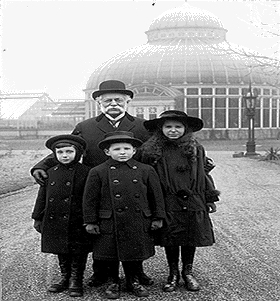
Henry John Heinz
BORN: 11 October 1844.
DIED: 14 May 1919.
|
How He Started. The story of the company is the life story of Mr. Heinz. His forbears were persons of official note, as well as producers of good wine, far back in the beginning of the seventeenth century. Henry saw the opportunity to turn an honest penny supplying a want in the matter of table delicacies. He began with horse radish which he dressed in a new way, put it in bottles and peddled it in a basket carried on his arm. Then he used a barrow, and as the product of his garden multiplied in bulk and variety, a horse and cart became a necessity, and instead of depending on individual sales to families he began to sell to groceries, all of his goods bearing a special mark invented by himself, and making for fame. The rapid growth of the business of young Heinz, the addition of more and more land to the "garden," the creation of new and good things for the tables of those who knew good things, yet more and more land, more space for preparation and putting up of the delicacies in attractive forms, genius in advertising, the big house in Second Avenue and then the bigger house, and then the beginning of the wonderful house on the North Side which came to be one of the show houses for visitors from every part of the world. Heinz holdings: At the time of Mr. Heinz's death, the North Side establishment had more than 4,600 employees and there were no fewer than 22 acres of floor space; there were a score of branch factories, 71 salting houses, about 40,000 acres of land under cultivation, 40,000 people assisting in harvesting the crops, 45 distributing centers, 400 traveling salesmen in various parts of the world, this and much more from the small beginning of a single room in a little two-story building in the suburban borough of Sharpsburg, which put into shape for the tables of a few, instead of the tens of millions who now use the Heinz product, the horse radish in the little garden to the rear of the house of the father of Mr. Heinz. At more than a dozen places in the United States, and at many points in foreign countries, gardens were established amid the most fertile lands that in the event of the crop failing in one place, it would be prolific in another, and, for convenience in shipping, establishments for the preparation and bottling or canning, or otherwise encasing the finished product were erected. Aside from his epigram that every successful business must be "run by heart power," he had another memorable saying: "Make all you can honestly, save all you can prudently, give all you can wisely." He made everyone connected with his many great establishments feel that in him they had a friend. He gave liberally but wisely, and in connection with the above motto, he said that "He who enjoys the first two and deprives himself of the latter privilege (that of giving) denies himself the greatest enjoyment of life." Mr. Heinz always kept in close touch with the younger men of the firm and all of the employees of the institution to give them encouragement and enthusiasm, impressing on them and on the heads of departments that it was only by the development of the men in their charge that they themselves would develop, and that this spirit should permeate every department of the business. Every head of a department was impressed with the wisdom of keeping in close touch and sympathy with those under their direction and the pursuance of this system unified every interest, and from master to the humblest workman and woman there was solidarity, a marching together of the most patriotic and loyal army, such as has been seen in few of the great institutions of the world. It was one of Mr. Heinz's most gratifying thoughts that no strike had ever occurred in connection with his industry. Added to these business phases of the great industry were elaborate means for the comfort and enjoyment of all connected with him. He instituted a lecture hall, library, bathrooms, lunch rooms, roof garden, wholesome vaudeville and minstrel entertainments for which he would employ some of the best professional talent. In the gallery he had hundreds of landscapes and historical pictures, and in the library most of the classics and better works of modern fiction and poetry. At the time of his death, Mr. Heinz was vice president of the Western Pennsylvania Exposition Society, director of the Union National Bank, Western Insurance Company and of the Chamber of Commerce; chairman of the commission to devise means to protect Pittsburgh from floods; director of the Pittsburgh Tuberculosis Sanatorium, West Penn Hospital; president of the Pennsylvania State Sunday School Association. He was a member of the Duquesne, Pittsburgh and Oakmont Country Clubs. |
|
Previous Page |
Return Home |